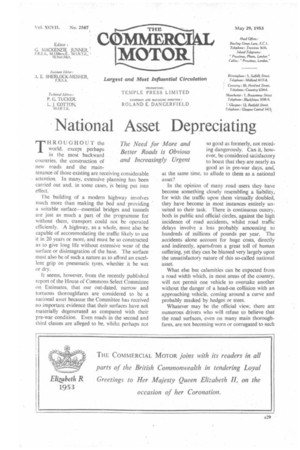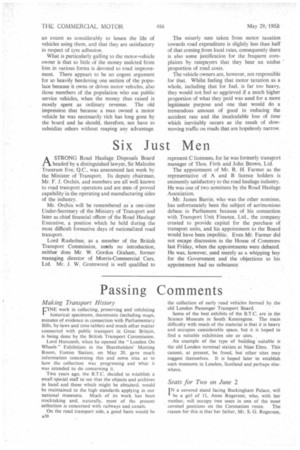National Asset Depreciating
Page 31

Page 32

If you've noticed an error in this article please click here to report it so we can fix it.
THROUGHOUT the world, except perhaps in the most backward countries, the construction of new roads and the maintenance of those existing are receiving considerable attention. In many, extensive planning has been carried out and, in some cases, is being put into effect.
The building of a modern highway involves much more than making the bed and providing a suitable surface—essential bridges and tunnels are just as much a part of the programme for without them, transport could not be operated efficiently. A highway, as a whole, must also be capable of accommodating the traffic likely to use it in 20 years or more, and must be so constructed as to give long life without extensive wear of the surface or disintegration of the base. The surface must also be of such a nature as to afford an excellent grip on pneumatic tyres, whether it be wet or dry.
It seems, however, from the recently published report of the House of Commons Select Committee on Estimates, that our out-dated, narrow and tortuous thoroughfares are considered to be a national asset because the Committee has received no important evidence that their surfaces have no materially degenerated as compared with their pre-war conditiOn. Even roads in the second and third classes are alleged to he, whilst perhaps not so good as formerly, not receding dangerously. Can it, however, be considered satisfactory to boast that they. are nearly as good as in pre-war days, and, at the same time, to allude to them as a national asset?
In the opinion of many road users they have become something closely resembling a liability, for with the traffic upon them virtually doubled, they have become in most instances entirely unsuited to their task. There is continuous outcry, both in public and official circles, against the high incidence of road accidents, whilst road traffic delays involve a loss probably amounting to hundreds of millions of pounds per year. The accidents alone account for huge costs, directly and indirectly, apart.from a great toll of human suffering, yet they can be blamed very largely upon the unsatisfactory nature of this so-called national asset.
What else but calamities can be expected from a road width which, in most areas of the country, will not permit one vehicle to overtake another without the danger of a head-on collision with art approaching vehicle, coming around a curve and probably masked by hedges or trees.
Whatever may be the official view, there are numerous drivers who will refuse to believe that the road surfaces, even on many main thoroughfares, are not becoming worn or corrugated to such an extent as considerably to lessen the life of vehicles using them, and that they are satisfactory in respect of tyre adhesion.
What is particularly galling to the motor-vehicle owner is that so little of the money mulcted from him in various forms is devoted to road improvement. There appears to be no cogent argument for so heavily burdening one section of the populace because it owns or drives motor vehicles, also those members of the population who use public service vehicles, when the money thus raised is mostly spent as ordinary revenue. The old impression that because a man owned a motor vehicle he was necessarily rich has long gone by the board and he should, therefore, not have to subsidize others without reaping any advantage. The miserly sum taken from motor taxation towards road expenditure is slightly less than half of that coming from local rates, consequently there is also some justification for the frequent complaints by ratepayers that they bear an undue proportion of road costs.
The vehicle owners are, however, not responsible for that. Whilst feeling that motor taxation as a whole, including that for fuel, is far too heavy, they would not feel so aggrieved if a much higher ploportion of what they paid was used for a more legitimate purpose and one that would do a tremendous amount of good in reducing the accident rate and the incalculable loss of time which inevitably occurs as the result of slowmoving traffic on roads that are hopelessly narrow.




























































































